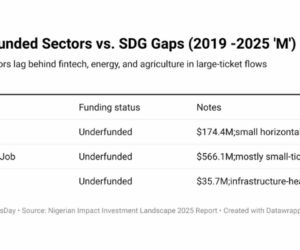…Lawal unveils translation hub to help small banks, fintechs meet deadline
Nigeria’s payments industry is undergoing one of its most significant transformations in decades as the Central Bank of Nigeria (CBN) leads the migration from the long-standing ISO 8583 messaging format, introduced globally in 1987, to the modern ISO 20022 standard.
The migration, which marks the beginning of a new era for digital payments in Africa’s largest economy, aims to modernize the country’s financial infrastructure and enable greater efficiency, interoperability, and innovation across banks, fintechs, and payment service providers.
Akeem Lawal, the managing director for Payment Processing & Switching (Purepay) at Interswitch, at Moonshot by TechCabal in Lagos, described the transition as long overdue.
Read also: Interswitch drives digital innovation through seamless payments
“Recently, the Central Bank announced the migration from ISO 8583. It was built in 1987. Let that sink in for a while. The technology standard on which we’ve been building payments for the last 20 years was built in 1987. It is time to modernize that,” he said.
Lawal explained that the adoption of ISO 20022 will provide the foundation for a more robust and inclusive digital economy, one that accommodates both card-based and non-card payment channels. “The new standard creates a modernized platform that allows us to build digital economies. We have put that infrastructure in place.”
ISO 8583, the legacy messaging standard, has powered global electronic payments for decades, governing how financial data, such as ATM and card transactions, are transmitted between institutions. However, its structure has become outdated in a world now dominated by digital wallets, instant transfers, and data-driven banking.
ISO 20022, in contrast, introduces a richer, XML-based data model that supports more detailed information within transactions. It allows for enhanced interoperability across payment systems, better fraud detection, and improved compliance with international standards. Many advanced economies, including the EU, UK, and the United States, have already begun or completed similar transitions.
Lawal noted that the CBN’s directive to migrate by the end of October reflects a broader commitment to modernizing Nigeria’s payments landscape.
Yet, he acknowledged that not all institutions, particularly smaller banks and fintechs, have the resources or technical capacity to complete the switch immediately.
To ease the transition, Lawal revealed the creation of a translation hub, a middleware solution designed to help institutions connect their existing legacy systems to ISO 20022-compliant platforms without major overhauls.
“We recognize that there will be smaller players who cannot make huge investments. So part of what we’ve done is create a translation hub that allows banks and other financial institutions to connect their existing platforms to it. It automatically converts their transactions into ISO 20022,” he explained.
Read also: ‘Digital payments are foundation of broader transformation in commerce’
The initiative provides a quick migration path for institutions racing to meet the CBN’s compliance deadline. It also ensures continuity in transaction processing while enabling the gradual modernization of backend infrastructure.
Lawal emphasized that the ISO 20022 upgrade is not just a technical update but a strategic foundation for the next phase of innovation in payments, including real-time settlements, request-to-pay capabilities, and smarter data exchange. “Nigeria is already among the top three countries in the world for real-time payments by transaction volume. But if we are to build new use cases and expand digital commerce, we must modernize the payment technology we have,” he noted.
Beyond compliance, Lawal said the ultimate goal is to future-proof Africa’s financial infrastructure, enabling seamless innovation and collaboration. “We may build an infrastructure that lays the foundation, but collaboration is what drives momentum and trust is what fuels the journey,” he said.









